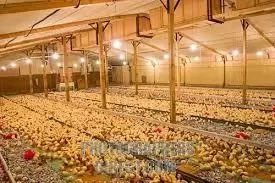How To Start Hatchery Business In Nigeria
In this post, I will show you how to start hatchery business in Nigeria. This is like a sample hatchery business plan that you can use to set up your own hatcheries in Nigeria.
Hatchery business is a very lucrative business especially if you know how to do it well. If you are interested in this business, simply follow the guidelines here to get started.
👉 Relocate to Canada Today!
Live, Study and Work in Canada. No Payment is Required! Hurry Now click here to Apply >> Immigrate to CanadaThe poultry industry in Nigeria has recently experienced a rapid expansion. From the increase in 185,300MT of poultry products in 2001 to 268,000MT in 2011, to the Government’s recent push into other sectors (agriculture included) of the economy due to the fallen oil sector. It is therefore evident that opportunity exists for more growth and expansion in Nigeria’s poultry industry.
Read Also: Cost of Starting a Fish Farm in Nigeria

A subsector of the Nigerian poultry industry that has a high growth opportunity is the hatchery industry and it is such that you can make maximum profit in provided you are ready to make substantial investment in it.
Why? Because, the recent ban on importation of poultry products has left the major production and supply of poultry products in the hands of local farmers. Thus, leaving a big opportunity for you as an individual seeking to (establish) start an hatchery business in Nigeria.
As the saying goes, that “Success comes when opportunity meets preparation”, it is true and that is the very reason I have written this post. In essence, I seek to prepare you enough to make use of the opportunity that abounds in the hatchery industry in Nigeria.
Summarily, I will engage you in a 15-20minute session of teaching you the wherewithals you need to have and to know before you set up an hatchery business in Nigeria.
Without any further ado, let’s go straight to what you should know before starting an hatchery business in Nigeria.
Before I go further, to clearly understand what the hatchery business is, we must first know what an hatchery is.
👉 Relocate to Canada Today!
Live, Study and Work in Canada. No Payment is Required! Hurry Now click here to Apply >> Immigrate to CanadaWhat Is An Hatchery
An hatchery is a place designated for hatching fertile eggs into day old chicks especially on a commercial scale. Can you see that?
Commercial scale, yes there’s one that’s personal and non-commercial meaning that an individual can just decide to use a table top incubator to hatch 10-20 fertilized eggs that your backyard 20 hens have produced without selling them (the chicks).
But, the kind of hatchery that we shall consider in this article is the commercial, medium to large scale hatchery because I consider more of an investor and a would-be entrepreneur rather than just a poultry hobbyist or enthusiast that is playing around with raising chickens and hatching their eggs in a small-scale enterprise farm.
Now, having a basic understanding of what an hatchery is, what’s done there, and what kind or scale of hatchery business we are going to talk about in this article; let’s go straight up to those things that you need to put in place when considering starting an hatchery business in Nigeria.
Read Also: How To Start Broiler Farming Business in Nigeria
1. Draw up an hatchery business plan or feasibility report
This is the first and most fundamental step in setting up an hatchery business in Nigeria. You have to define what particular section or niche market in the Nigerian hatchery industry you’re going to focus on.
How do I mean? There are many niche markets in the Nigerian hatchery industry: you can decided to focus on hatching one or more of chickens, ducks, guinea fowls, quails, turkey etc.
There is already established market for all of these but the one that is more viable and has the highest demand is hatching chickens.
Where you’ve already established a relationship and got customers in this niche, it is a very profitable niche with a non-stop aggregate demand year-in-year-out in Nigeria.
You achieve this by conducting market surveys, seeking advice from experts and others who have been in the industry before you.
In the feasibility study, you determine what scale you’re starting with, what are you financial expectations after a particular period? what does your cost analysis look like?, what are your opportunities and profitability index of your proposed hatchery business? How do I source for hatchable eggs?
Am I going to be buying eggs or I’ll have a breeder farm to complement my hatchery business? All these questions are necessary before you take any action to actually establish an hatchery business and they will be answered by you in your business plan or feasibility report. For more information on how to write effective business plans, see this post by Eugene Mba on infoguidenigerian.com
2. Siting and Location
Land procurement for the hatchery depends on the anticipated size of the hatchery and this is determined by the number chicks you plan to hatch weekly (to be determine and stated on your business plan or feasibility report).
The hatchery business requires a building which will accommodate the various sections in an hatchery such as egg receiving, egg handling, egg fumigation, egg candling, egg setting (incubation) and hatching, chick handling rooms etc.
Thus for this purpose, you can get a land in any of yet-developing areas around you. Because, you don’t want to spend all your startup capital on land alone, you’ll still need money to procure equipment and machines, procure eggs(as the case may be), hire labourers (technical and non-technical). However, in siting and locating your hatchery, you must follow these guidelines:
a. It should be located far away from residential areas to avoid transmission of diseases to people. You can fence your hatchery to keep it entirely separate from the outside environment. A buffer distance of around 500meters is enough to maintain distance from residential areas.
b. Hatchery should be located far from poultry houses to prevent transmission of diseases from the hatchery to the poultry and vice versa.
c. Hatchery should not be located near railways or where road construction and heavy equipment that can cause earth vibrations are operated.
d. A motorable road access that leads to the hatchery should be provided to enhance easy transportation of eggs to the hatchery and chicks from the hatchery to the market.
e. Ensure that the land your hatchery is to be built upon is well-drained irrespective of the season. Marshy or water-logged areas is not good for siting an hatchery. Transportation of products especially during rainy season will be hindered.
f. There should be regular supply of water and electricity. The hatchery needs daily, a high volume of water for washing equipment, disinfection, etc. thus, in your planning ensure you specify the source of water for the hatchery’s daily operations. Also electricity is very important, you need it to run your incubators, coolers, egg candlers.
Because of the epileptic power supply in the nation, locating your hatchery in industrial areas or farm complexes will help, and even plan to have backup generators in case of power failure anytime.
Read Also: How to Start Poultry Farming in Nigeria
3. Construction and Design
In constructing a standard hatchery based on the anticipated size of the hatchery, ensure you consult a qualified architecture to help you design a plan(blueprint) for the hatchery complex. Basically, the rooms or units that should be in a typical hatchery include the:
a. Egg receiving room
b. Egg cleaning room
c. Egg Cold room
d. Egg fumigation room
e. Incubator (setter/hatcher) room
f. Egg candling and transfer room
g. Chick handling room
h. Chick sorting and vaccination room
i. Chick dispatch room
j. The Wash bay
However, the construction and design of the hatchery must follow a regular flow and order in such a way that there is no reversal in the egg-to-flow of operations.
The egg from the receiving room should move straight regularly through each handling section in a forward direction till hatching and final dispatch. This will prevent contamination (which can reduce hatchability) and hatching of unmarketable chicks.
4. Equipment and facilities
You must also consider these in setting up an hatchery. You need equipment like incubators (setter only or setter+hatcher combined), trolleys, egg crates, egg baskets, chick baskets, pressure washer, fumigation box, working benches and tables, candling equipment, generators and backup generators, cooling machines, truck (for delivery), vacuum cleaners, you need conveniences rooms for tyour staff.
All of these are the equipment and infrastructures you need, however, the quantity of each that you will procure is determined by the anticipated size of your hatchery.
5. Source of Hatchable Eggs
Before you venture into establishing an hatchery in Nigeria, you should consider another important pre-requisite. That is the source of hatchable eggs.
How will you get hatchable eggs to hatch per week. Basically, for the chicken egg, incubation to hatching takes a total of 21 days.
Putting this in mind, how will you get a regular supply of hatchable eggs? There are two(2) ways of sourcing for hatchable eggs. They are:
Personal breeder farm
Using this method, you are determining to have a personal breeder(parent stock) farm along side your hatchery that will serve as source of hatchable eggs for your hatchery business.
An advantage of this is that it helps to reduce the cost of production of the hatchery business. However, the cost of setting up and running a breeder farm is a challenging one itself.
Whereas, this is one of the main secret of the big players in the Nigerian poultry and hatchery industry such as Obasanjo Farms Nigera, CHI farms, Zartech, Amo Byng Nig Ltd, Farm Support etc.
My advice is that Rome was not built in a day, unless you have the money to invest in both (breeder farm and hatchery) at the same time, you should first start your hatchery with hatchable eggs from third parties and other farms. When you’ve experienced growth in the nearest future, you can decide to have your own parent stock farm.
Read Also: How to start a Fishery Business in Nigeria
Purchase of hatchable eggs from other parent stock farms
This involves you deciding to source for hatchable eggs from other breeder (parent stock) farms around at a price. The downside of this is that the quality of chicks that will hatch from these eggs sourced from different farms cannot be ascertained.
Also, there may be failure or shortage in hatchable egg supply which will affect your production thus, you might not be able to meet customers’ demands.
I suggest you conduct a separate feasibility study using each of the two methods and choose the one that is most feasible to enhance profitability in your hatchery business.
6. Market
Though I have briefly talked about this at the business plan and feasibility study section, I should still stress that before you go into production, ensure you have solid information on how you will market your day old chicks.
You should do a market survey and research who are your target customers and how you will reach them. You customers are basically poultry farmers, wholesalers, thus, in location and siting your hatchery, you must consider where these farmers are in order to reach them. This will guide you in siting your hatchery, putting facilities such as delivery van in place.
After all, you want to set up the hatchery in a place easily accessible to the customers. Knowing an mastering the marketing trends and demand in the industry will also help you to know the type and frequency of hatching you’ll do.
That is, either single or multistage hatching, the size of incubators you’ll buy, the number of generators and power backups, your scale of operations etc.
From this you can also define strategies that you can put in place to have your own share of the already existing market. Because, to be honest with you, you’ve got a lot of competitors who are even already established. But this is sure that the poultry and hatchery market in Nigeria is large enough for everyone (including you that is just starting out) to profit.
The last things that I will say on marketing is How to create awareness. There are many publicity media that you can use. They include radio, television, you can feature your hatchery on livestock programmes organised by the ministry of Agriculture etc.
Also ensure that register your business name with the Corporate Affairs Commission (CAC) and the Poultry Association of Nigeria (PAN).
7. Labour (Manpower)
The hatchery operation is such that requires different expertise to run successfully. You need hatchery managers to direct the daily and business operations in the hatchery (unless if you can do it yourself having the skills required), supervisors, technicians, receptionist, accountant, drivers, cleaners, casual workers etc.
To successfully establish an hatchery in Nigeria or wherever, there must be a sure access to qualified manpower to ensure a successful running of the hatcher’s operation.
The number of staff to be employed however depends on your intended scale of operation, size of hatchery, and the market size.
Speculatively, for an hatchery that turns out about 100,000 day old chicks per week, you need 1 hatchery manager, 3 supervisors, an accountant, a receptionist, and up to 10 casual staff, and for this scale to start up, you might need up to 50 Million Naira.
However, this speculation can vary because of the irregular change in market prices of goods especially those imported such as incubators.
Read Also: How profitable is poultry farming in Nigeria
So you want to start, conduct a thorough market research and feasibility study to know the requirements and the cost analysis of setting up an hatchery business in Nigeria.
Thank you





